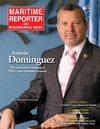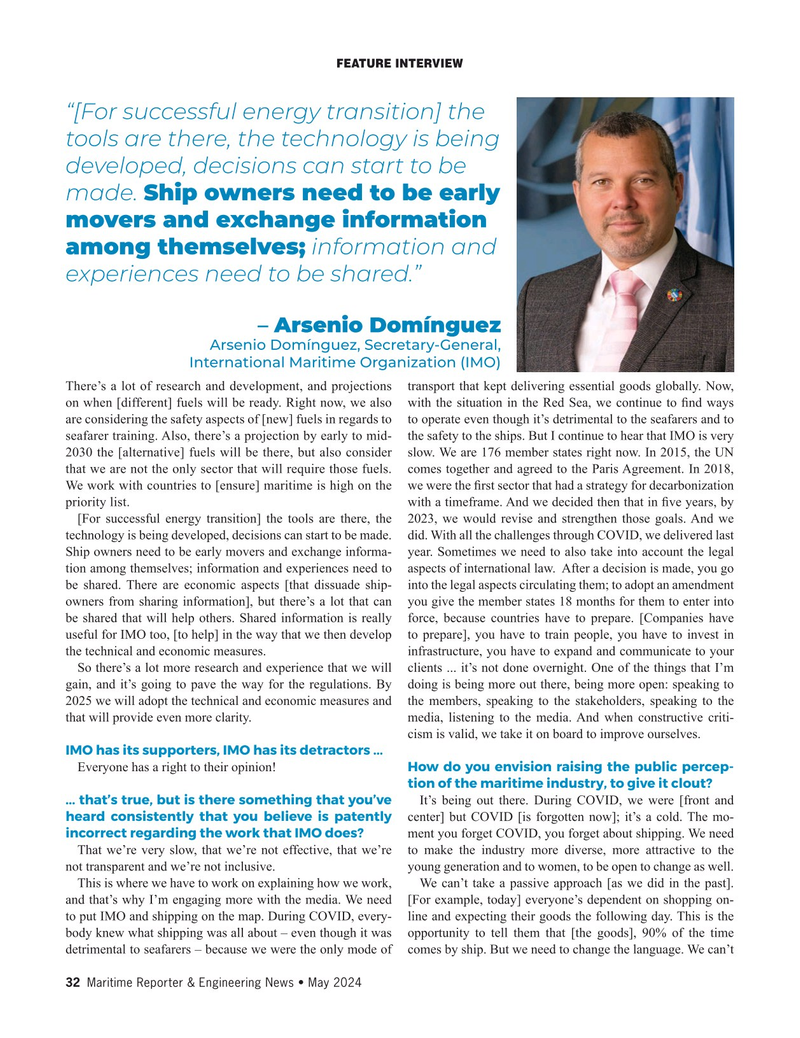
Page 32: of Maritime Reporter Magazine (May 2024)
Read this page in Pdf, Flash or Html5 edition of May 2024 Maritime Reporter Magazine
FEATURE INTERVIEW “[For successful energy transition] the tools are there, the technology is being developed, decisions can start to be made. Ship owners need to be early movers and exchange information among themselves; information and experiences need to be shared.” – Arsenio Domínguez
Arsenio Domínguez, Secretary-General,
International Maritime Organization (IMO)
There’s a lot of research and development, and projections transport that kept delivering essential goods globally. Now, on when [different] fuels will be ready. Right now, we also with the situation in the Red Sea, we continue to ? nd ways are considering the safety aspects of [new] fuels in regards to to operate even though it’s detrimental to the seafarers and to seafarer training. Also, there’s a projection by early to mid- the safety to the ships. But I continue to hear that IMO is very 2030 the [alternative] fuels will be there, but also consider slow. We are 176 member states right now. In 2015, the UN that we are not the only sector that will require those fuels. comes together and agreed to the Paris Agreement. In 2018,
We work with countries to [ensure] maritime is high on the we were the ? rst sector that had a strategy for decarbonization priority list. with a timeframe. And we decided then that in ? ve years, by [For successful energy transition] the tools are there, the 2023, we would revise and strengthen those goals. And we technology is being developed, decisions can start to be made. did. With all the challenges through COVID, we delivered last
Ship owners need to be early movers and exchange informa- year. Sometimes we need to also take into account the legal tion among themselves; information and experiences need to aspects of international law. After a decision is made, you go be shared. There are economic aspects [that dissuade ship- into the legal aspects circulating them; to adopt an amendment owners from sharing information], but there’s a lot that can you give the member states 18 months for them to enter into be shared that will help others. Shared information is really force, because countries have to prepare. [Companies have useful for IMO too, [to help] in the way that we then develop to prepare], you have to train people, you have to invest in the technical and economic measures. infrastructure, you have to expand and communicate to your
So there’s a lot more research and experience that we will clients ... it’s not done overnight. One of the things that I’m gain, and it’s going to pave the way for the regulations. By doing is being more out there, being more open: speaking to 2025 we will adopt the technical and economic measures and the members, speaking to the stakeholders, speaking to the that will provide even more clarity. media, listening to the media. And when constructive criti- cism is valid, we take it on board to improve ourselves.
IMO has its supporters, IMO has its detractors ...
Everyone has a right to their opinion! How do you envision raising the public percep- tion of the maritime industry, to give it clout?
... that’s true, but is there something that you’ve It’s being out there. During COVID, we were [front and heard consistently that you believe is patently center] but COVID [is forgotten now]; it’s a cold. The mo- incorrect regarding the work that IMO does? ment you forget COVID, you forget about shipping. We need
That we’re very slow, that we’re not effective, that we’re to make the industry more diverse, more attractive to the not transparent and we’re not inclusive. young generation and to women, to be open to change as well.
This is where we have to work on explaining how we work, We can’t take a passive approach [as we did in the past]. and that’s why I’m engaging more with the media. We need [For example, today] everyone’s dependent on shopping on- to put IMO and shipping on the map. During COVID, every- line and expecting their goods the following day. This is the body knew what shipping was all about – even though it was opportunity to tell them that [the goods], 90% of the time detrimental to seafarers – because we were the only mode of comes by ship. But we need to change the language. We can’t 32 Maritime Reporter & Engineering News • May 2024
MR #5 (18-33).indd 32 5/3/2024 8:48:46 AM

 31
31

 33
33
